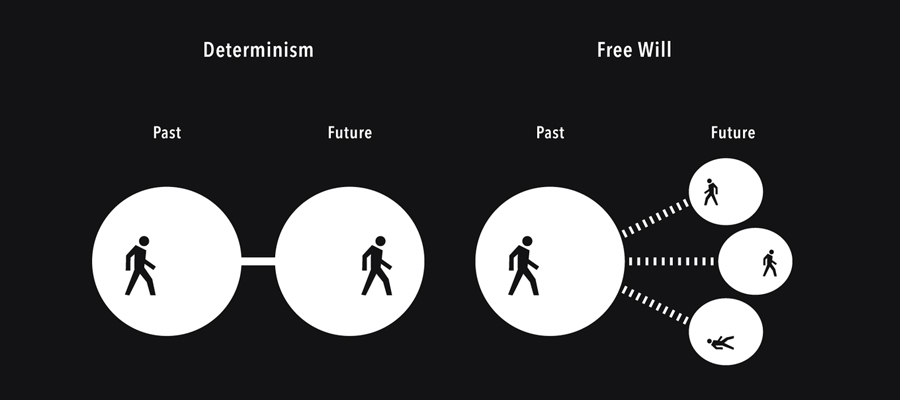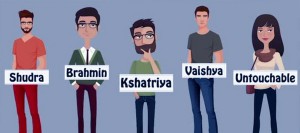Determinism of Science
Most philosophers agree that whether determinism is true or not, is a contingent problem; that is, determinism does not have to be right or wrong. If so, then whether determinism is true or not is an empirical problem, which can be found by investigating the ways of this world, not through philosophical argument. This is not to deny that the truth of determinism will have metaphysical implications. For one, the truth of determinism will require that natural laws are not only probabilistic – because if so, then the conjunctions of the past and the laws will not require a unique future. Furthermore, as we shall see, philosophers are very concerned about the implications of the truth of determinism for free will. But the point to note is that if the truth of determinism is a contingent truth about how the world really is, then scientific inquiry must give us insight into this issue. Let us say that a possible world is deterministic if causal determinism is true in that world. There are two ways the world fails to be deterministic.
Certain parts of physics give us reason to doubt the truth of determinism. For example, the standard interpretation of Quantum Theory, the Copenhagen Interpretation, states that the laws governing nature are indeterministic and probabilistic. According to this interpretation, whether small particles such as quarks turn in a certain direction at a particular time are explained correctly only by probabilistic equations. Although the equation can predict the likelihood that a quark turns left at a certain time, whether it really turns or is not indeterministic or random.
There are also deterministic interpretations of Quantum Theory, such as the Many-World Interpretation. Fortunately, the results of the debate over whether Quantum Theory is best interpreted deterministically or uncertainly can largely be avoided for our current purposes. Even though microparticle systems such as quarks cannot be determined, it is possible that systems involving larger physical objects such as cars, dogs, and humans are deterministic. It is possible that the only uncertainty is at the scale of microparticles and that the macro object itself obeys deterministic laws. If this is the case, then causal determinism as defined above is, in fact, wrong, but “almost” right. That is, we can replace determinism with “near determinism,”
Can we have free will even if determinism is true?
Is a useful way to distinguish the main positions regarding free will. Compatibility experts answer this question in agreement. They believe that one can have free will even if causal determinism is true or even if close determinism is true. In the following cases, I will eliminate this qualification.
In other words, the existence of free will in a world that might be compatible with a deterministic world. For this reason, this position is known as “compatibilism,” and its supporters are called “compatibilists.” According to compatibilist experts, it is possible for a person to be determined in all his choices and actions and still make some of his choices freely.
According to “incompatibilist”, the existence of free will is incompatible with the truth of determinism. If a given world is deterministic, then no agent in that world has a free will for that reason. Furthermore, if one assumes that having free will is a necessary condition to be morally responsible for one’s actions, then the mismatch of free will and determinism will cause a mismatch of moral responsibility and causal determinism.
There are at least two types of incompatibilities. Some incompatible think that determinism is true of the real world, and thus no agent in the real world has free will. Such incompatibilities are often called “hard determinists” [see Pereboom (2001) for the defense of hard determinism]. Other incompatibilities argue that the real world is not deterministic and that at least some agents in the real world have free will. This incompatibility is referred to as “libertarian” [see Kane (2005), specifically chapters 3 and 4]. However, these two positions are incomplete. It is possible that someone is incompatible, thinking that the real world is not deterministic, but still thinks that agents in the real world do not have free will. Although it is unclear what such a position is called (perhaps “free will deniers”), it illustrates that hard determinism and libertarianism do not exhaust the way to be incompatible. Because all incompatibilisations, whatever their lines, agree that the falsity of determinism is a necessary condition for free will and because compatibility disproves this statement, the following section talks about incompatibility and compatibility.
It is also important to remember that both compatibility and incompatibility are claims about the possibility. According to compatibilist experts, it is possible that the agent is fully determined and not yet free. On the contrary, incompatibilist believes that such a situation is impossible. But no position by itself makes a claim about whether the agent really has free will or not.
If the truth of determinism is a contingent problem, then whether an agent is morally responsible or not will depend on whether the actual world is deterministic or not. Furthermore, even if the true world is uncertain, it does not immediately follow that the present uncertainty is the type required for free will.
The incompatibilists say that free will is incompatible with the truth of determinism. Not all arguments for incompatibility can be considered here; let’s focus on two main varieties. The first variation is built around the idea that having free will is a matter of having choices about our particular actions, and that having choices is a matter of having genuine or alternative choices about what someone does. The second argument are built around the idea that the truth of determinism will mean that we do not cause our actions in the right way. The truth of determinism will mean that we do not begin our actions in a significant way and our actions are ultimately not controlled by us. In other words, we don’t have the ability to determine our own destiny.
References
- Finch, Alicia and Ted Warfield (1998). “The Mind Argument and Libertarianism”.
- Fischer, John Martin (1984). “Power Over the Past,” Pacific Philosophical Quarterly.
- Descartes, René (1998). Discourse on Method and Meditations on First Philosophy, 4th edition (Hackett Publishing Company).
- Frankfurt, Harry (1971). “Freedom of the Will and the Concept of a Person,” reprinted in Pereboom (1997)
- Helm, Paul (1994). The Providence of God (InterVarsity Press).
- Kane, Robert (1998). The Significance of Free Will (Oxford University Press).
- Lewis, David (1981). “Are We Free to Break the Laws?” Theoria 47: 113-121.
- O’Connor, Timothy (2000). Persons and Causes: The Metaphysics of Free Will (Oxford University Press).
- Pereboom, Derk (2001). Living Without Free Will (Cambridge University Press).
- Smilansky, Saul (2000). Free Will and Illusion (Clarendon Press).
- Strawson, Galen (1994). “The Impossibility of Moral Responsibility,” Philosophical Studies.
- Van Inwagen, Peter (1983). An Essay on Free Will (Clarendon Press).





